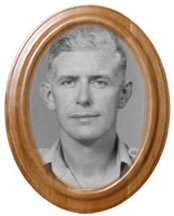
Return To Veterans Accounts Index
A SOLDIER’S MEMORY OF THE QUEEN’S CORONATION
2ND JUNE 1953
By
Col. Lionel John Lindsay Hill 77668
"Coronation
training will start on 13th May. 1953, and will take priority over all other
activities"; so read the instructions to the three officers and ten men
finally selected to represent our Infantry Battalion for the procession from
the Abbey, a detachment which I was to command. The Battalion's Colours, suitably
escorted by two 6ft. 2in. subalterns, the remainder of us with rifles or bayonets
fixed or swords carried as appropriate, spent the next three weeks on Coronation
training, which might be thought more appropriate for an Everest assault!
We were stationed at Colchester, and we marched and drilled and drilled and
marched all over Essex. Often on the road shortly after dawn to avoid the traffic.
The processional obstacles of Marble Arch and Admiralty Arch were simulated
on the Barrack Square, as was Hyde Park Corner. Marching ten abreast, each
arch could only be negotiated by splitting 50 yards before the arch, three
men each side and four in the centre, so as to meet again on the far side.
Then at last we were ready, complete with Regimental and Queen's Colours, to
join the other 12,228 men and women in the procession, which included 770 British
Infantrymen from all the line regiments of the British Army. And, of course,
it had to rain!
Our accommodation the night before was sleeping in beds and bunks at Olympia,
which had been turned into one vast dormitory. We found we had no safe place
for the Colours, which represent the regiment's duty to the Monarch, and must
be 100% secure at all times. With all the Banks closed, our two subaltern officers
decided the only way to safeguard them was to sleep on them.
Coronation Day dawned to find us assembling for final inspections and checks.
The whole concourse then converged on Westminster to split-second timing. This
vast column of marching men, horses, cars and carriages had to be assembled
and decisions made, as to which flank directs, who gives orders to change arms
and when are bayonets fixed. When to march at ease, when to salute or eyes
right, what happens if it rains. Which of the ten bands do we march to, when
do we eat and what about loos etc. etc.
For the procession, we were required to be able to march fifteen miles in Ceremonial
Order from Olympia, round the four-mile procession routes and back. To attempt
to simulate a rifle or sword. For those who have never tried holding these
things, try walking with a 7Ib inert weight on a stick held on your shoulders,
your arm at right angles, rigid to the hand, and do it for not one, but fifteen
miles. Allowing yourself short breaks (if you must). Add to that, a firm upright
stance in fairly stiff clothes and don't let your head wander to right or left,
walk as if you owned the world, digging your heels into the ground with each
step. You may now see why we, normally fit men, had to become superlatively
fit if we were to do justice to this royal occasion.
The procession from the Abbey began at about 2.50 p.m and my memories of this
day, as we marched between the vast crowds lining the route, are of cheering,
happy people, many clapping as we passed. I hoped that the Queen would feel
the same spontaneity of the response, because all this effort and assembly
was for her, and part of the tribute, willingly paid, of duty, service and
loyalty to the Crown by so many people. The route took us past the Albert Hall,
Hyde Park Corner and along Constitution Hill, the Mall, Park Lane, Oxford Street
and Regent Street. Then back to Olympia, where after six hours and fifteen
miles, we returned to "dismiss", and later to join the crowds in
less formal celebrations and to hear from our friends who had been watching
on the route or on television, whether all had been well with our particular
contribution.
In the Mess at Colchester, my two young daughters* and their mother (Sylvia,
the V.A.D. of 1937) had been invited to look in on T.V. The 2nd June was also
the younger child's birthday and this and the excitement of the occasion proved
too much for her-"There's Daddy", being applied to most of my fellow
processors, just to make sure!

Col. Lionel John Lindsay Hill
